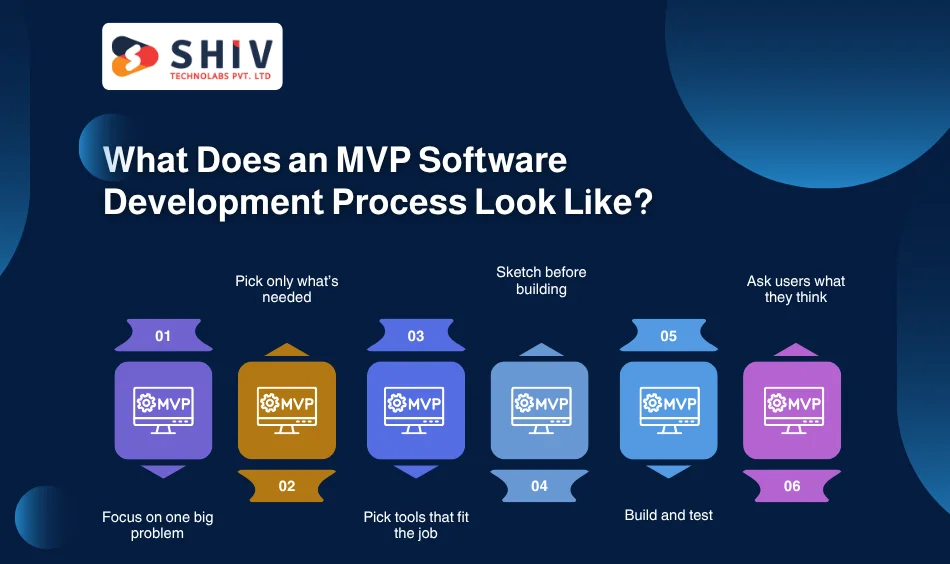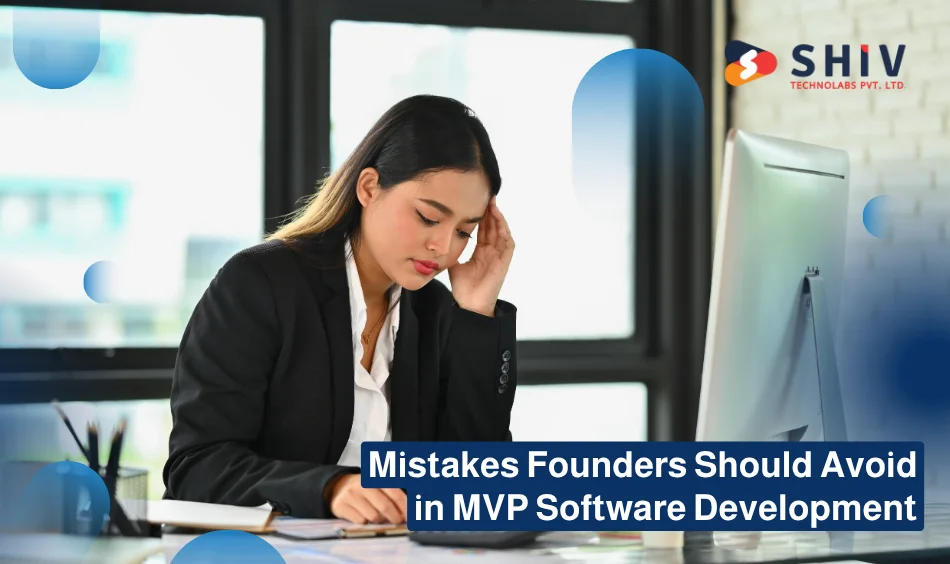Table of Contents
Startups often chase big ideas. But ideas don’t fail; execution does. Most early-stage startups collapse not because their concept lacked potential but because they built too much, too fast, and missed what customers truly needed.
That’s where MVP software development steps in. It helps startup founders test their idea quickly without burning their entire budget. You launch fast, get real feedback, and improve based on how people actually use the product.
As a Startup Software Development Company, we help non-technical founders bring ideas to life with lean MVPs. Whether you’re building a SaaS tool, marketplace, or mobile app, this guide will help you start smart.
What Is MVP Software Development, and Why Does It Matter?
A Minimum Viable Product (MVP) is a working version of your software with just enough features to solve a core problem. It’s not a demo. It’s not a prototype. It’s a functional product that real users can interact with.
MVP software development builds the absolute essentials first. It helps you launch fast, reduce risk, and gather user feedback early.
Real-world MVP examples:
- Dropbox started with a demo video explaining the idea.
- Airbnb listed a few apartments on their website to test demand.
- Uber launched with basic ride-booking in San Francisco only.
These companies didn’t wait until everything was perfect. They tested early, learned fast, and scaled based on real demand.
MVP vs Full-Feature Product: A Quick Comparison
| Feature | MVP Software | Full Product |
|---|---|---|
| Purpose | Idea validation | Market capture & retention |
| Time to Build | 4–12 weeks | 6–12+ months |
| Cost | $5,000–$25,000 | $50,000+ |
| Feature Set | Must-haves only | Full suite + integrations |
| Feedback Collection | Immediate | Delayed or post-launch |
An MVP helps you avoid spending months building something nobody wants. That’s why it’s critical for early-stage teams.
What Does an MVP Software Development Process Look Like?

When building an MVP, don’t think about the full product. Start with a small, clear plan. Here’s how the process usually goes:
1. Focus on one big problem
Ask yourself: “What issue am I solving?” Stay honest here. Don’t guess. If the problem isn’t real, no app will fix it.
2. Pick only what’s needed
Write down everything you want the app to do. Then delete most of it. Keep the few features that support your core goal. Leave the rest for later.
3. Pick tools that fit the job
Choose a stack that works for your product, not what’s trendy. Flutter works well for mobile. Node.js is strong for backends. Stick with simple, proven tools.
4. Sketch before building
Before coding anything, draw the app’s layout. Tools like Figma help a lot. A good sketch saves time. It also helps you notice issues early.
5. Build and test
Don’t try to be perfect. Just build the basics and test them. Launch it to a small group. Focus on function, not polish.
6. Ask users what they think
Watch real people use your product. Let them break it. Ask what confused them. Fix those problems first. Then build your next feature.
Key Benefits of Building an MVP First
MVPs help you move with confidence and speed, two things every startup needs in the beginning.
Here’s why starting with a custom MVP matters:
- Faster launch – Get your product out in weeks, not months.
- Lower costs – You only pay for features that solve the core problem.
- Better decisions – Real user feedback guides your next steps.
- Investor trust – A working MVP shows commitment and traction.
Building a custom MVP means you don’t have to guess what works. You’ll know.
Is MVP Right for Your Startup?
- Do you have limited time or funding?
- Are you unsure about market demand?
- Do you want user feedback before scaling?
- Are you building your first software product?
If you answered “yes” to any of the above, an MVP could save your idea and your budget.
How Much Does MVP Software Development Cost?
There’s no single answer. It depends on your idea, platform, and the features you want. But you can plan around some general numbers.
Typical MVP Cost Breakdown
| Area | Cost Range |
|---|---|
| App design (UI/UX) | $1,500 – $5,000 |
| Frontend code | $2,000 – $10,000 |
| Backend setup | $2,500 – $15,000 |
| Testing | $500 – $3,000 |
| Total | $6,500 – $33,000 |
What You Can Expect Based on Budget:
- $10K or less: You’ll get a simple MVP. One platform. Few screens. One core function.
- Around $25K: Enough for a full mobile app and basic admin tools.
- Up to $50K: Room for complex flows, dashboards, and analytics.
Fixed Cost vs Agile Pricing
- Fixed cost fits clean ideas with no scope changes.
- Agile works better if your idea might shift during development.
Best Tech Stacks and Tools for MVP Software in 2025
The tech you choose can speed up or slow down your MVP. The goal isn’t to pick the “coolest” tools. It’s to pick what works.
Here are popular choices:
- Frontend (Web): React.js, Next.js
- Frontend (Mobile): Flutter, React Native
- Backend: Node.js, Python (FastAPI, Django)
- Databases: Firebase, Supabase, PostgreSQL
- Design: Figma, Sketch
- Infra/Hosting: Vercel, Heroku, AWS
You can also try no-code tools like Bubble or Glide if you have no tech background.
Mistakes Founders Should Avoid in MVP Software Development

First-time founders often make these errors. Avoid them to save time and money.
- Adding features that don’t solve the main problem
- Skipping user interviews before building
- Ignoring user feedback post-launch
- Choosing a tech stack just because it’s popular
- Working with freelancers who can’t scale the code later
- Writing too much code before testing the idea
Keep your focus tight. Build small. Listen early. Adjust fast.
When to Move Beyond MVP to Full Product
Your MVP is live. Users are signing up. What’s next?
It’s time to think bigger if:
- Users keep coming back
- You’re hitting usage or revenue milestones
- Feedback becomes consistent
- People start asking for more features
Don’t rush to rebuild everything. Sometimes, a few changes make your MVP stable enough to grow.
But if your early codebase can’t handle traffic or new features, consider a fresh rebuild.
At this point, a solid tech partner can help you scale without breaking what works.
Why Work With a Startup Software Development Company for Your MVP?
Hiring the right team matters more than most founders think.
Here’s what you get with a trusted startup development partner:
- 💡 Strategy + tech in one place
- ⚡ Faster time to launch
- 🔁 Flexible working models (fixed, hourly, hybrid)
- 🔧 Post-launch support and improvements
- 👥 Dedicated team for long-term scale
Shiv Technolabs helped dozens of first-time founders develop custom MVP software and launch with confidence.
Final Thoughts – Your MVP Isn’t the End. It’s the Start.
Startups that build MVPs don’t guess what works; they find out fast.
A good MVP gets you real users, real feedback, and real momentum. It helps you spend wisely and scale when ready.
If you’re unsure where to begin, we can help. We’re a Startup Software Development Company that helps founders plan, build, and grow MVPs from scratch.





















